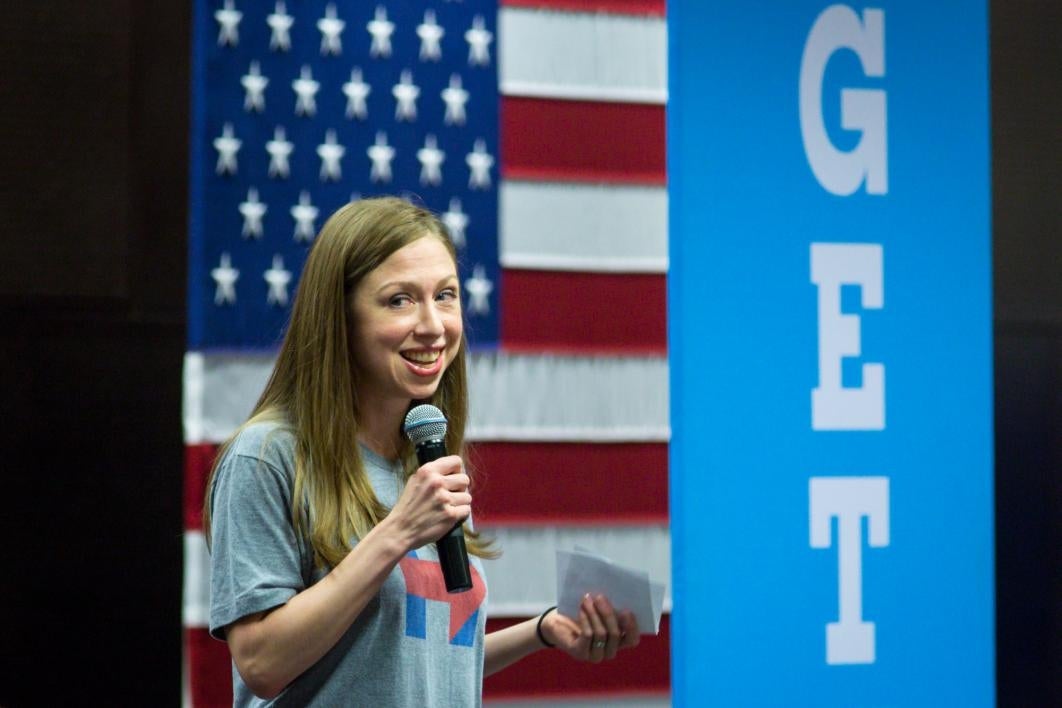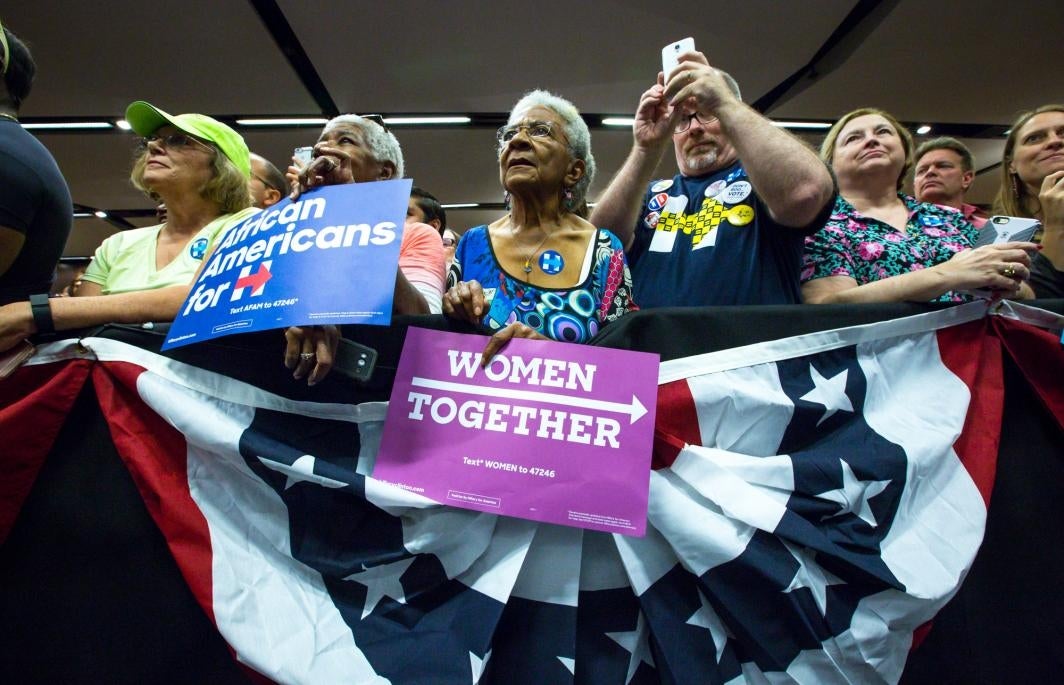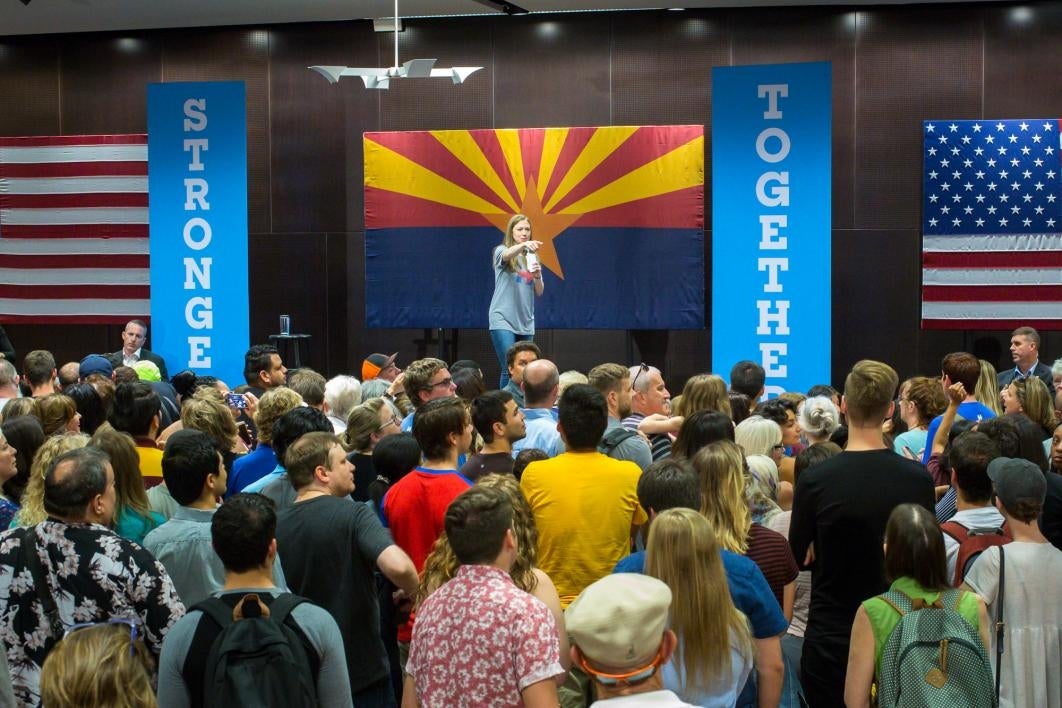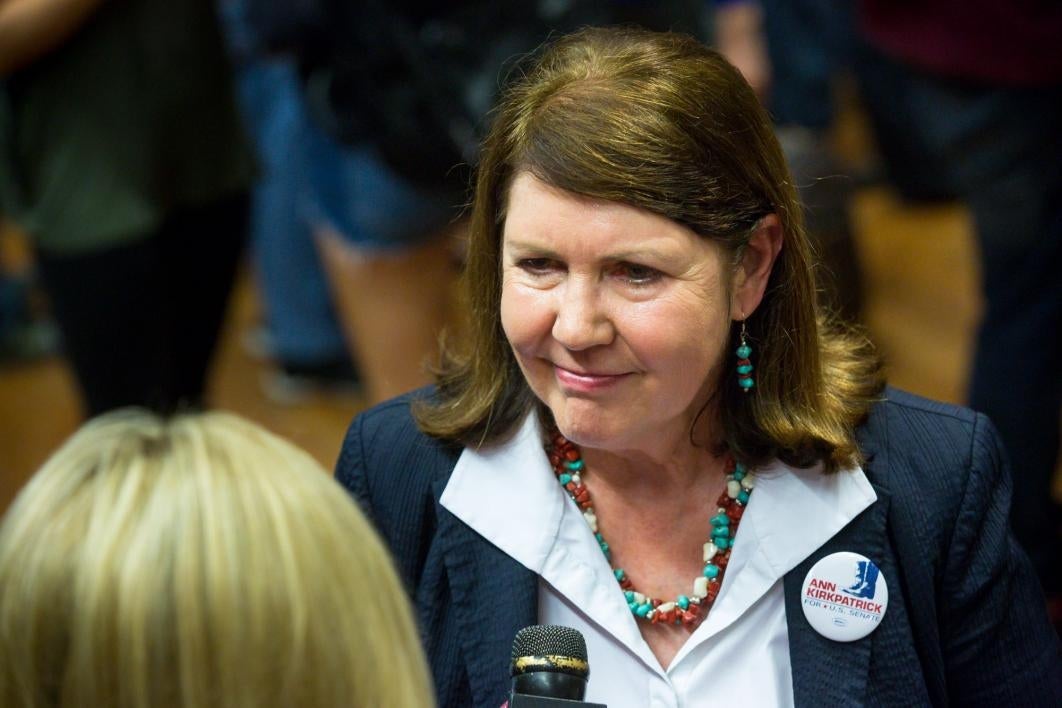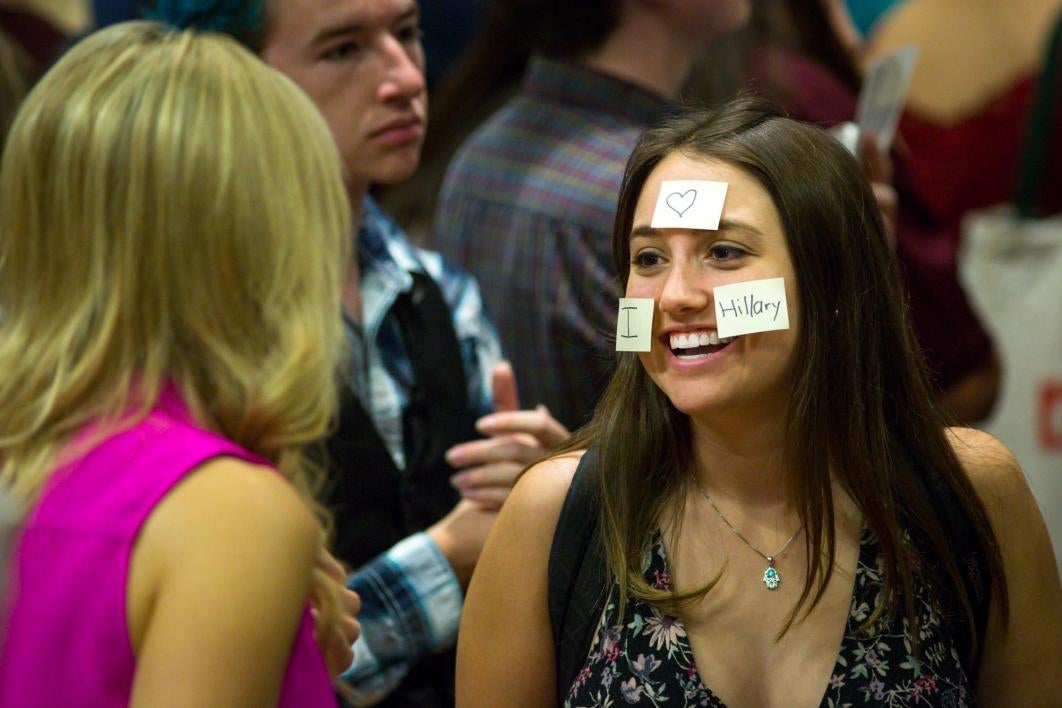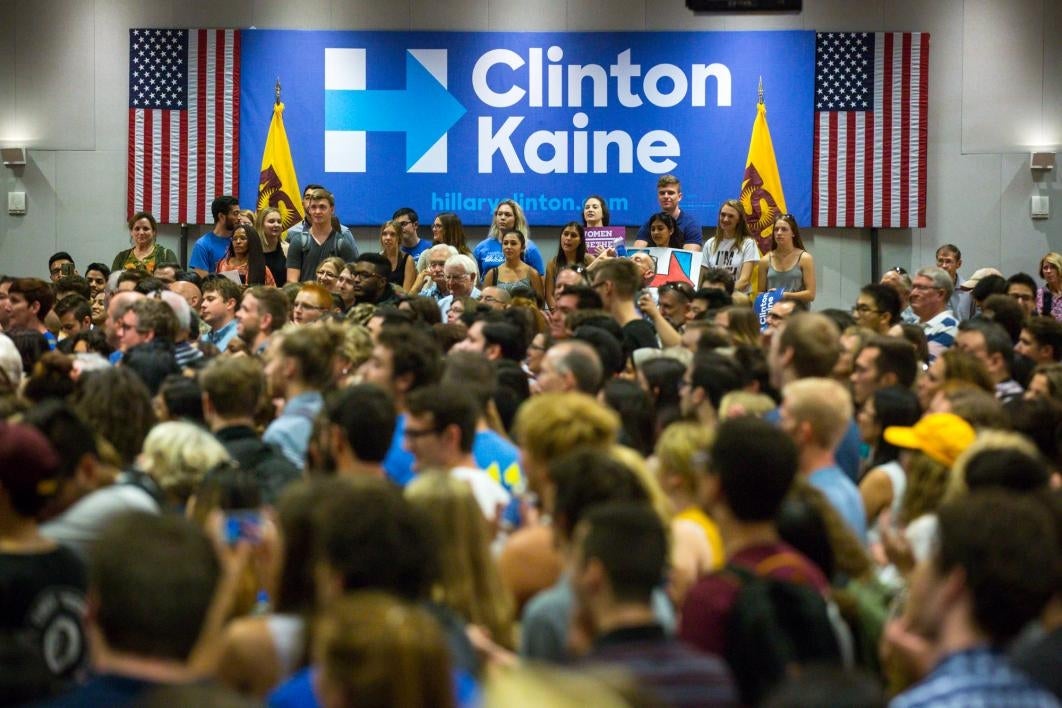Chelsea Clinton urged young people at Arizona State University to not only vote this election, but also to consider running for office in the future.
Clinton, daughter of Democratic presidential nominee Hillary Clinton, spoke to a crowd of nearly 800 people in the Memorial Union in Tempe on Wednesday afternoon and told students that she hopes they are not turned off by the harsh rhetoric of the campaign, in which Clinton is facing Republican nominee Donald Trump.
“I’m deeply passionate about encouraging young people who are interested in changing our world to think about running for public office, and I’m so hopeful that all of the nastiness will not turn those of you who are interested in a career in public service away from pursuing that,” Chelsea Clinton said.
She said she has no plans to run for office herself, but “it’s hugely important that we not let cynicism win.”
She touched on several of her mother’s proposals, including Hillary Clinton’s plan to address student debt, saying it would allow students from families who make $120,000 or less attend a state university tuition free. The plan also would permit public service as loan repayment.
Clinton praised Arizona’s early voting policy and the campus effort to register students.
“Voting should be easy,” she said. “We think there are tens of thousands of new registered voters in Arizona, including from the nonpartisan voter-registration effort on the ASU campus. You should all feel really good about helping people become enfranchised.”
At ASU, get-out-the-vote efforts have been a collaboration among the Undergraduate Student Government, the ASU Young Democrats and the ASU College Republicans.
Austin Marshall, president of the ASU Young Democrats, said that about 3,000 students were registered by the Oct. 10 deadline.
“We’ve also been making calls, not just to students but to people in the area,” said Marshall, who introduced Chelsea Clinton at Wednesday’s event, which also featured an additional 275 people in an overflow room. “We’ve been knocking on doors, making sure people turn in their ballots or making sure they know where to vote early and that they know the proper IDs they need.”
Kevin Calabrese, president of the ASU College Republicans, said that although college campuses traditionally lean left politically, his group has seen a lot of interest in Donald Trump.
“We’ve noticed there is a surprising amount of enthusiasm for Donald Trump and his campaign, and I think it’s his high-energy nature and charisma that differentiates him from other candidates in the past,” Calabrese said.
“We’ve seen a lot of interest, and it’s helped us to recruit a lot of members for our club.”
Marshall said he believes interest in the election is building among students.
“People are getting more excited as we get closer and closer to Election Day,” he said. “It’s more important than ever that students vote because we know what’s at stake, and we’ll be living with it for a long time.”
“It’s an exciting time to be in Arizona now in a way we haven’t seen in a long time,” he said, referring to Arizona’s new status as a battleground state. A poll released this week by the Arizona Republic, the Morrison Institute for Public Policy at ASU and Cronkite News shows that 39 percent of likely voters surveyed said they would vote for Clinton, with 33.9 percent supporting Trump and 20 percent undecided in the statewide telephone poll.
Arizona as battleground
But considering Arizona’s history — the state has voted GOP in every presidential election except Bill Clinton in 1996 — could the state actually turn blue?
The data says yes.
“I think it’s a battleground state for a number of tangible reasons rather than wishful thinking on the part of any campaign,” according to Richard Herrera, an associate professor in the School of Politics and Global Studies at ASU.
Typically, Republicans are the largest voter bloc on the state, followed by those with no party preference. But recent voter registration has shown big gains by the Democrats, Herrera said.
“Second, there’s been a confluence of polls by different polling organizations since the end of September that show some advantage for Clinton over Trump,” he said. “It’s not just one poll.”
Herrera pointed to several reasons for the shift. One is that Arizona has a relatively higher level of education among white voters.
“If you compare Arizona to Iowa, you see a big difference in terms of white voters with a college degree, by about 20 percent,” he said. “And higher-educated white voters are trending toward Clinton.”
Another reason is the wide gender gap. Typically, Democrats poll about 5 to 7 percentage points higher among women, and Republicans poll higher among men by about the same amount.
“In this election, the gender gap is much more skewed to the Democratic candidate — by about 15 percent — and the gap among men is about the same as it always is,” he said.
Third is the huge push by many organizations to register Latino voters, who typically vote Democrat.
So does this mean that young voters may help turn Arizona blue? That’s trickier to predict, Herrera said.
While the new poll shows Clinton with a tight lead overall, her lead among voters ages 19 to 25 is much larger — about 20 points.
“One thing that mitigates against that is that 35 percent haven’t decided yet. What that tells us is that this close to the election, if they haven’t decided yet, they probably won’t vote. That would be consistent with voter turnout in the past,” he said.
Young people might be drawn to vote because of the two ballot measures — Proposition 205, which would legalize marijuana, and Proposition 206, which would increase the minimum wage.
“So that might be an incentive for them to turn out to vote, but it’s complicated because there’s less enthusiasm than in 2008 among young voters,” Herrera said.
Two ASU students who attended Chelsea Clinton’s speech on Wednesday said they felt their fellow students were voting against one candidate rather than for someone they support.
Harrison Ambrose, a sustainability freshman, said, “The general tone is pretty negative, and a lot of the rhetoric is ‘I’m only going to vote to not get the other person in office.’ We’re going to have somebody in office for the next four years so hopefully we can get behind that person.”
Nicole Cox, also a sustainability freshman, agreed: “I’ve seen a lot of interest in voting, but it seems to be focused on the negative.
“I would tell students to find things they’re passionate about and think about their values and what they want to see happen in the future instead of focusing on the hate.”
Voting early
Chelsea Clinton, who spoke and answered questions for about an hour, told the students to never think that their vote doesn’t matter.
“President Obama won North Carolina by 14,000 votes in 2008. That’s one to two votes per precinct,” she said. “For your friends or classmates who say your vote doesn’t matter, we have really powerful examples in our lifetime that are testament to the contrary.”
For the first time, students can vote on campus on Election Day, at the Sun Devil Fitness Center in Tempe.
Establishing the on-campus polling place was a collaborative effort of the Undergraduate Student Government, the ASU College Republicans and the ASU Young Democrats.
On Election Day, students can vote at the Sun Devil Fitness Center on the Tempe campus from 6 a.m. to 7 p.m. That location is also for voters in the Hudson and Tempe precincts, roughly from the 202 to 16th Street and Mill to McClintock. That covers all students in the residence halls in Tempe but not everyone who lives off campus.
Additionally, both the ASU College Republicans and the ASU Young Democrats are urging people to vote at ASU’s early voting site to avoid confusion and long lines on Election Day.
The early voting site is at Palo Verde West, Room 151, now through Nov. 4. Hours are 10 a.m. to 6 p.m. Mondays through Wednesdays and 10 a.m. to 5 p.m. Thursdays and Fridays. That location is open to all voters registered in Maricopa County. Parking validation will be provided for the Fulton Center Parking Garage. (Find an interactive campus map here.)
To vote in any election, Arizona requires all voters to present an approved form of photo identification that includes name and address. Voters who don’t have a formal photo ID will need two of the following: utility bill, "official election mail,” voter ID card, vehicle registration or bank statement mailed to the address of the registered voter.
Top photo: Chelsea Clinton speaks at the Memorial Union on ASU's Tempe campus on Wednesday. Photo by Charlie Leight/ASU Now
More Law, journalism and politics

Annual John P. Frank Memorial Lecture enters its 26th year
Dahlia Lithwick, an MSNBC analyst and senior legal correspondent at Slate, is the featured speaker at the School of Social Transformation’s 26th annual John P. Frank Memorial Lecture on…

The politics behind picking a romantic partner
A new study reveals the role that politics play when picking out a romantic partner — particularly for older adults.“Findings show that politics are highly salient in partner selection across gender…

Tips to make tax season less taxing
When it comes to highly unpleasant experiences, filing taxes is probably up there with root canals — which is why people put off doing them. But tax season is here, and in an effort to alleviate…



